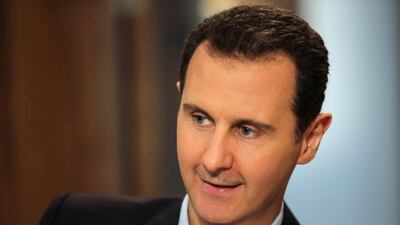The US told Syrian President Bashar Al Assad that it will not recognise the result of his country's presidential election unless the voting is free, fair, supervised by the UN and represents all of Syrian society.
The acting US deputy ambassador to the UN, Jeffrey DeLaurentis, said: "It's clear that the regime will leverage the coming presidential elections in May to unfairly claim Assad's legitimacy."
Stressing the Biden administration’s opposition to elections that are not free, fair, representative and UN-supervised, Mr DeLaurentis echoed UN Secretary General Antonio Guterres in saying that “a credible political settlement cannot wait”.
He was speaking at an event on Thursday to mark 10 years of conflict in Syria. The seminar was organised by the Syrian National Coalition, which represents groups opposed to Mr Al Assad.
In October, the US and several western allies accused the Syrian government of delaying the drafting of a new constitution to waste time until the presidential election this year and avoid UN-supervised voting as called for by the UN Security Council.
Council Resolution 2254, adopted unanimously in December 2015, endorsed a road map to peace in Syria that was approved in Geneva on June 30, 2012, by representatives of the UN, Arab League, EU, Turkey and all five permanent Security Council members – the US, Russia, China, France and Britain.
It calls for a Syrian-led political process starting with the establishment of a transitional governing body, followed by the drafting of a new constitution and ending with UN-supervised elections.
The resolution said elections should meet “the highest international standards” of transparency and accountability, with all Syrians – including members of the diaspora – eligible to participate.
“We remain firm in stating that the only way forward is to push for a political process that meets the conditions outlined in Security Council Resolution 2254,” Mr DeLaurentis said.
He said the US recognises that the Syrian opposition has tried "to meaningfully participate in the constitutional drafting process" but faces "the Assad regime's continuous refusal to engage in good faith".
"In the absence of serious and meaningful co-operation by the regime and its allies," Mr DeLaurentis said the US continues to support efforts by UN special envoy Geir Pedersen to release detainees and account for the missing and to provide humanitarian relief to Syrians in need.
Since 2012, he said, the US provided more than $12.2 billion in aid to Syrians in Syria and the region.
Mr DeLaurentis said the Biden administration will continue campaigning to retain and expand the UN’s delivery of aid across borders, which has been limited to one crossing point from Turkey to the mainly rebel-controlled north-west at the insistence of Russia, Syria’s closest ally.
“The United States is committed to do what is right to sustain the lifeline for the 3.4 million Syrians in the north-west and to reinstate the UN’s humanitarian access in the north-east” from Iraq, which was eliminated last year as Russia demanded, he said.
“I assure you that our steadfast support for the Syrian people will not end,” Mr DeLaurentis said. “That a decade has passed means we must redouble our efforts to encourage a credible political transition, to hold the regime accountable for its abuses, and to maximise our delivery of humanitarian aid.”

